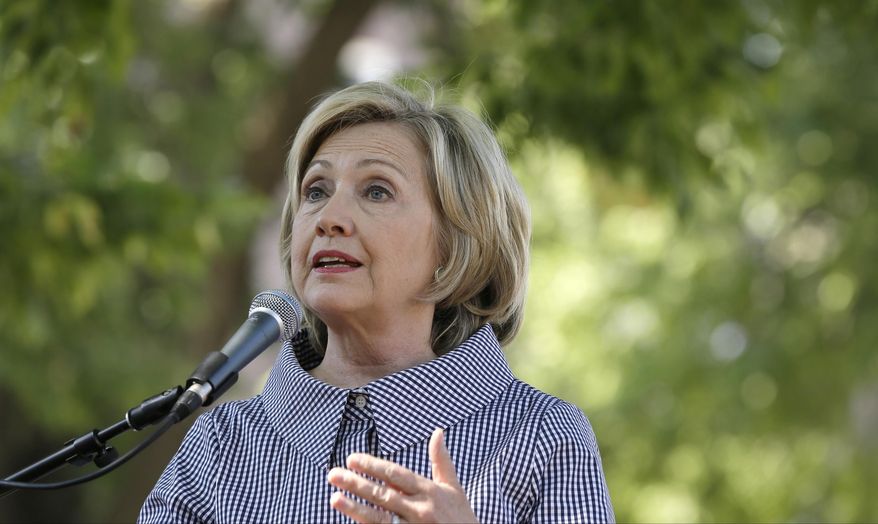
A federal judge said Thursday that former Secretary of State Hillary Rodham Clinton’s unique email arrangement violated government policy and prodded the department to talk with the FBI to determine what documents can be recovered from the computer server and flash drives used to store her emails.
Judge Emmet G. Sullivan was surprised that the State Department hadn’t made that request and poked at the administration’s claim that the FBI needed to be left alone to conduct its investigation. He gave the agencies 30 days to figure out whether emails can be recovered.
“We wouldn’t be here today had this employee followed government policy,” the judge said, casting doubt on Mrs. Clinton’s claim that she did nothing wrong when she set up her own email server at her home in New York and used it for all of her government business, and belatedly returned 30,000 emails to the department.
The administration agreed to have the State Department and FBI work together to determine what documents could be recovered, suggesting that the government will have to try to reconstitute the emails Mrs. Clinton’s attorney has asserted were expunged from the server.
Peter D. Wechsler, the Justice Department lawyer handling the case for the State Department, balked at requests from the plaintiffs that the government go back and look for backup tapes or try to find Mrs. Clinton’s old computer or BlackBerry.
Mr. Wechsler even refused to say whether the FBI had possession of the server and flash drives. He said the State Department, his specific client in the case, didn’t have direct knowledge of that. He said the plaintiffs are making assumptions based on claims by Mrs. Clinton’s attorney, David E. Kendall.
“I cannot definitively state what the current status is,” he said.
“The court needs to get an answer,” Judge Sullivan replied, saying Mr. Wechsler works for the Justice Department, the FBI is part of the department, and the government should be able to say where the server is and what kinds of records can be recovered.
In the end, Mr. Wechsler agreed to start a “dialogue” with the FBI.
The back-and-forth highlights how Mrs. Clinton has put President Obama in a difficult position, as he tries to balance loyalty to his former top diplomat with his obligations under open-records laws.
Judicial Watch is seeking records concerning the special work arrangement of Huma Abedin, a top Clinton personal aide who also worked for her in the State Department even as she collected pay from a private-sector employer.
It’s unclear whether Mrs. Clinton’s emails will contain any records about the arrangement, but Judicial Watch argues that the government cannot know for certain unless it has information about the extent of Mrs. Clinton’s emails. It has only her assurances right now.
Mrs. Clinton has said she didn’t break the law in using email on her own server rather than an account at State.gov. She said she has returned printed copies of about 30,500 messages that are government business, thus fulfilling her obligations.
She is not a party in the case, which Judicial Watch brought under the Freedom of Information Act.
In court filings Wednesday, the State Department said it never issued Mrs. Clinton a computer or other device such as a BlackBerry. That raises still more questions about the security of the BlackBerry she was using — presumably one she bought for herself off the shelf.
The State Department declined Thursday to say whether the BlackBerry was secure. Spokesman John Kirby insisted it would be “inappropriate” to talk about the matter because it is under investigation.
In court Thursday, Judge Sullivan seemed skeptical of the government’s attempt to keep Mrs. Clinton at arm’s length. He said the State Department appeared to be treating the former secretary differently from how it would have treated an employee who used the State.gov email system.
Mr. Wechsler acknowledged that if Mrs. Clinton had used the main State Department email system, officials would have gone back to search those documents themselves to see what records should be released. But because the government deems Mrs. Clinton’s email to be a personal account in this case, it’s up to her to decide which records are government business.
Mr. Wechsler said the department must accept Mrs. Clinton’s sworn assertions that she has followed through on her obligations.
“This was the former secretary using a personal email,” Mr. Wechsler said.
Judicial Watch attorney Michael Bekesha refused to concede that Mrs. Clinton’s email account was personal. He said any account the secretary of state sets up to do government business is by definition a government account and the entire file should belong to the government.
Judge Sullivan said he wants to tread lightly because of the number of cases seeking Mrs. Clinton’s emails. He said, however, that he might eventually be open to allowing discovery in the case, which would open up to scrutiny even more of Mrs. Clinton’s operations at the State Department.
He said he wants to wait until the FBI and State Department have their dialogue to see where things stand.


